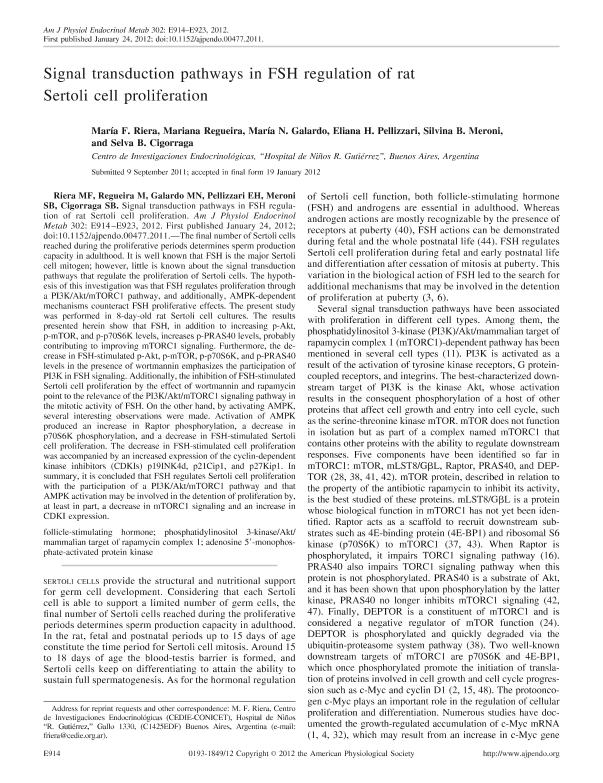Artículo
Signal transduction pathways in FSH regulation of rat sertoli cell proliferation
Riera, Maria Fernanda ; Regueira, Mariana
; Regueira, Mariana ; Galardo, Maria Noel Lujan
; Galardo, Maria Noel Lujan ; Pellizzari, Eliana Herminia
; Pellizzari, Eliana Herminia ; Meroni, Silvina Beatriz
; Meroni, Silvina Beatriz ; Cigorraga, Selva Beatriz
; Cigorraga, Selva Beatriz
 ; Regueira, Mariana
; Regueira, Mariana ; Galardo, Maria Noel Lujan
; Galardo, Maria Noel Lujan ; Pellizzari, Eliana Herminia
; Pellizzari, Eliana Herminia ; Meroni, Silvina Beatriz
; Meroni, Silvina Beatriz ; Cigorraga, Selva Beatriz
; Cigorraga, Selva Beatriz
Fecha de publicación:
04/2012
Editorial:
American Physiological Society
Revista:
American Journal Of Physiology-endocrinology And Metabolism
ISSN:
0193-1849
Idioma:
Inglés
Tipo de recurso:
Artículo publicado
Clasificación temática:
Resumen
The final number of Sertoli cells reached during the proliferative periods determines sperm production capacity in adulthood. It is well known that FSH is the major Sertoli cell mitogen; however, little is known about the signal transduction pathways that regulate the proliferation of Sertoli cells. The hypothesis of this investigation was that FSH regulates proliferation through a PI3K/Akt/mTORC1 pathway, and additionally, AMPK-dependent mechanisms counteract FSH proliferative effects. The present study was performed in 8-day-old rat Sertoli cell cultures. The results presented herein show that FSH, in addition to increasing p-Akt, p-mTOR, and p-p70S6K levels, increases p-PRAS40 levels, probably contributing to improving mTORC1 signaling. Furthermore, the decrease in FSH-stimulated p-Akt, p-mTOR, p-p70S6K, and p-PRAS40 levels in the presence of wortmannin emphasizes the participation of PI3K in FSH signaling. Additionally, the inhibition of FSH-stimulated Sertoli cell proliferation by the effect of wortmannin and rapamycin point to the relevance of the PI3K/Akt/mTORC1 signaling pathway in the mitotic activity of FSH. On the other hand, by activating AMPK, several interesting observations were made. Activation of AMPK produced an increase in Raptor phosphorylation, a decrease in p70S6K phosphorylation, and a decrease in FSH-stimulated Sertoli cell proliferation. The decrease in FSH-stimulated cell proliferation was accompanied by an increased expression of the cyclin-dependent kinase inhibitors (CDKIs) p19INK4d, p21Cip1, and p27Kip1. In summary, it is concluded that FSH regulates Sertoli cell proliferation with the participation of a PI3K/Akt/mTORC1 pathway and that AMPK activation may be involved in the detention of proliferation by, at least in part, a decrease in mTORC1 signaling and an increase in CDKI expression.
Archivos asociados
Licencia
Identificadores
Colecciones
Articulos(CEDIE)
Articulos de CENTRO DE INVESTIGACIONES ENDOCRINOLOGICAS "DR. CESAR BERGADA"
Articulos de CENTRO DE INVESTIGACIONES ENDOCRINOLOGICAS "DR. CESAR BERGADA"
Citación
Riera, Maria Fernanda; Regueira, Mariana; Galardo, Maria Noel Lujan; Pellizzari, Eliana Herminia; Meroni, Silvina Beatriz; et al.; Signal transduction pathways in FSH regulation of rat sertoli cell proliferation; American Physiological Society; American Journal Of Physiology-endocrinology And Metabolism; 302; 8; 4-2012; 914-923
Compartir
Altmétricas



